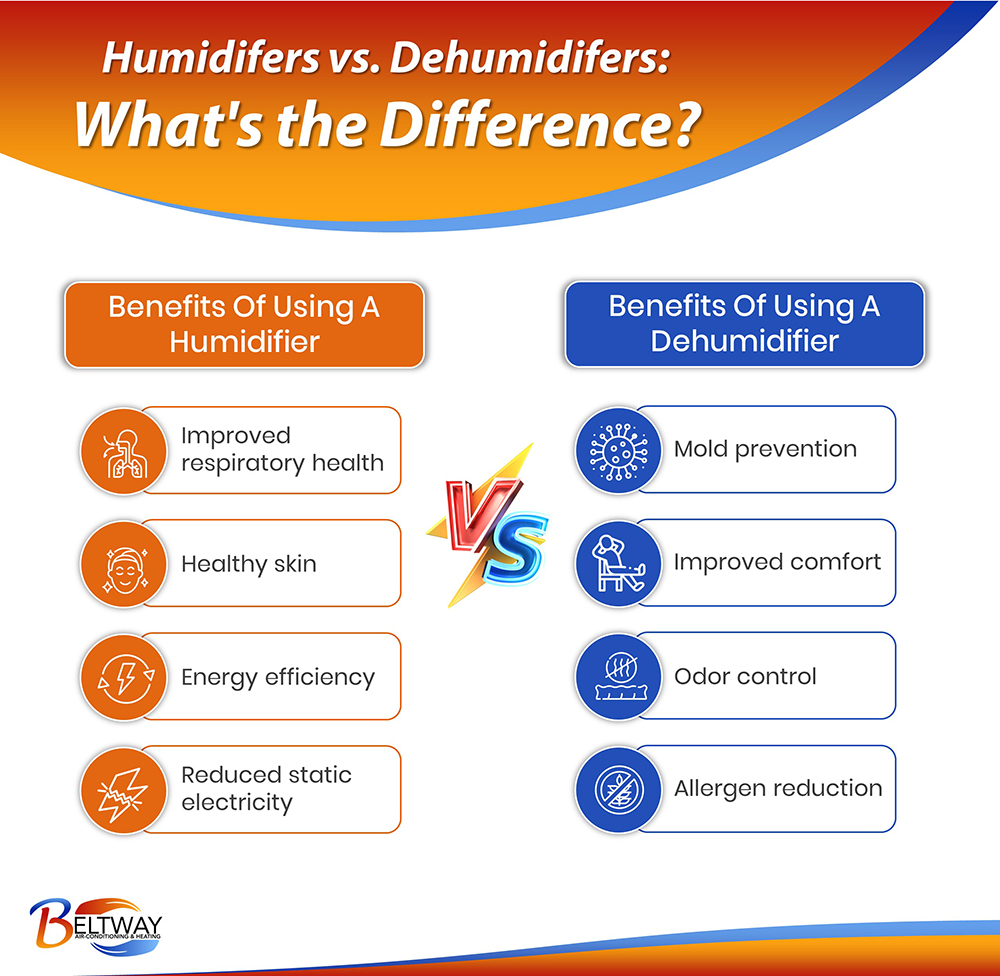At Beltway Air Conditioning, Heating & Plumbing, we understand that maintaining a comfortable indoor environment is essential for your overall well-being in Hanover, MD. One of the critical factors in achieving this comfort is controlling the humidity levels in your home. Humidifiers and dehumidifiers play pivotal roles, ensuring that your living spaces are neither too dry nor too damp.
What Are Humidifiers and Dehumidifiers?
Conversely, dehumidifiers operate by extracting excess moisture from the air, making them indispensable in humid regions. High humidity levels can foster mold growth, degrade indoor air quality, and trigger allergic reactions. By reducing humidity, dehumidifiers prevent these issues and create a more pleasant living space. It is especially crucial for areas such as basements and bathrooms, which are prone to dampness and can quickly become breeding grounds for mold and mildew.

How Do Humidifiers and Dehumidifiers Work?
Humidifiers come in different forms. Ultrasonic humidifiers employ ultrasonic vibrations to break water into fine mist particles released into the air, effectively increasing humidity levels. Steam vaporizers are another type that heats water to create steam before dispersing.
On the other hand, dehumidifiers first draw in moist air, then cool it to cause condensation of the moisture. This condensed moisture is collected and removed. The subsequently reheated air is then released back into the room.
When to Use a Humidifier
Utilize a humidifier when the air in your home becomes too dry, often leading to issues like dry skin, irritated eyes, and respiratory discomfort. Humidifiers can provide significant relief during colder months or in regions with low humidity.
By adding moisture to the air, these devices not only make breathing more comfortable but also contribute to the prevention of skin dryness and other discomforts that can arise due to parched indoor air.
When to Use a Dehumidifier
Consider employing a dehumidifier when your indoor spaces feel excessively damp and humid. High humidity levels can create a conducive environment for mold growth, mildew, and musty odors, which affect indoor air quality and pose potential health risks.
Dehumidifiers are particularly indispensable in areas more susceptible to moisture accumulation, such as basements and bathrooms. By effectively reducing humidity, these devices mitigate the risks associated with excessive moisture, ensuring a healthier living environment while safeguarding your home from the damaging effects of prolonged dampness.
Types of Humidifiers
When choosing the right humidifier for your indoor needs, considering the various types available is essential. Each type employs distinct mechanisms to achieve the common goal of enhancing indoor humidity levels.
Evaporative Humidifiers
Using a fan to blow air through a wet wick or filter, these humidifiers facilitate water evaporation, effectively humidifying the air. They are particularly effective in dry climates or during the winter months.
Ultrasonic Humidifiers
These devices harness ultrasonic vibrations to break water into fine mist particles released into the air. This mist increases humidity levels, making them ideal for maintaining a comfortable environment.
Steam Vaporizers
These humidifiers ensure consistent humidity levels by heating water to generate steam, which is subsequently cooled slightly before release. They are efficient in areas where maintaining precise humidity control is essential.
Types of Dehumidifiers
When it comes to controlling indoor humidity levels, understanding the various types of dehumidifiers available can significantly assist in making an informed choice. Dehumidifiers come in different forms, each designed to address specific needs and conditions.
Refrigerative Dehumidifiers
This widely used type employs a cooling mechanism akin to an air conditioner to condense moisture from the air. Reducing humidity levels helps prevent mold growth and maintain a more comfortable living space.
Desiccant Dehumidifiers
These dehumidifiers absorb moisture from the air, making them suitable for colder conditions. Desiccant dehumidifiers are used in spaces like closets and smaller areas where excess moisture can be an issue.
Benefits of Using a Humidifier
Maintaining balanced indoor humidity levels goes beyond comfort. It also has tangible benefits for your well-being and surroundings. Adequate humidity can significantly affect your overall health and the longevity of your possessions.
Advantages of maintaining optimal humidity include:
- Improved respiratory health
- Healthy skin
- Energy efficiency
- Reduced static electricity
Benefits of Using a Dehumidifier
Utilizing a dehumidifier can positively affect your indoor environment, from health and comfort to preserving the integrity of your living spaces.
You might notice such benefits of using a dehumidifier as:
- Mold prevention
- Improved comfort
- Odor control
- Allergen reduction
Humidifier vs. Dehumidifier: Which One Is Right for You?
If you find yourself contending with dry air that leads to discomfort, such as dry skin and respiratory issues, a humidifier can relieve you. Conversely, if you’re grappling with challenges like mold growth, constant dampness, or lingering musty odors, a dehumidifier could be the remedy to restore a healthier indoor atmosphere. Considering your space’s unique conditions and your comfort preferences will enable you to make a well-informed choice that optimizes your indoor living experience.
Humidifier Safety Tips
Ensuring the safety of your humidifier usage is crucial for maintaining a healthy indoor environment. By following these safety tips, you can enjoy the benefits of humidity control without any unwanted side effects.
Clean Regularly
Mold and bacteria can thrive in a humidifier’s damp environment. Regularly cleaning and disinfecting your humidifier according to the manufacturer’s instructions helps prevent the growth of these harmful microorganisms.
Use Distilled Water
Tap water contains minerals that can accumulate in your humidifier and disperse into the air, potentially causing respiratory issues. Using distilled water minimizes mineral buildup, ensuring the quality of the mist released into your living spaces.
Monitor Humidity Levels
Over-humidification can lead to issues like mold growth and excessive moisture, which can be detrimental to your health and home. Investing in a hygrometer allows you to accurately measure indoor humidity levels, enabling you to adjust your humidifier settings accordingly and maintain a comfortable, healthy environment.
Dehumidifier Safety Tips
Using a dehumidifier can significantly enhance your indoor comfort and air quality, but ensuring its safe operation is essential for optimal results.
Ensure Proper Placement
Position your dehumidifier in areas susceptible to moisture accumulation, such as basements or bathrooms. However, make sure there’s enough space around the unit to facilitate proper airflow.
Perform Regular Maintenance
To maintain peak performance, clean or replace filters as the manufacturer recommends. Clean filters ensure efficient operation and prevent airborne particles from recirculating in your space.
Empty the Tank
Regularly check and empty the water collection tank. Preventing tank overflow is essential to avoid water damage to your dehumidifier and the surrounding area. Regular maintenance prevents potential leaks or spills and ensures continuous dehumidification without interruption.
FAQs About Humidifiers and Dehumidifiers
Q: Can I use a humidifier and a dehumidifier in my home?
A: You can strategically use both devices to create a balanced indoor environment. Placing a humidifier in dry areas and a dehumidifier in damp regions helps address different humidity needs across your home.
Q: How do I know if my home’s humidity levels are balanced?
A: An effective way to gauge indoor humidity levels is by using a hygrometer. This device accurately measures the air’s moisture, helping you adjust your humidifier or dehumidifier settings as needed to maintain optimal humidity levels.
Q: Can incorrect humidity levels affect my health?
A: Indeed, extreme humidity levels can adversely affect your health. High humidity can exacerbate respiratory conditions and allergies, while low humidity can lead to dry skin and irritated airways. Maintaining balanced humidity is essential for creating a comfortable and healthy living environment.
Elevate Your Indoor Comfort With Expert HVAC Services
At Beltway Air Conditioning, Heating & Plumbing, our dedication to your indoor comfort is unwavering. Our comprehensive range of HVAC services encompasses installation, maintenance, and repair, effectively addressing all your heating and cooling needs. Proudly serving the Hanover area, our mission revolves around elevating your home’s comfort and efficiency.
Contact Beltway Air Conditioning, Heating & Plumbing in Hanover, MD, today for further details or to arrange a service. Your contentment is our ultimate focus!




